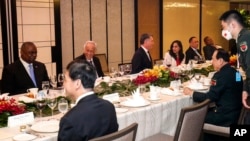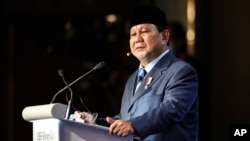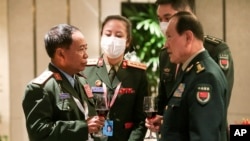The Shangri-La Dialogue in Singapore is Asia's most prominent security summit, in addition to being a hotspot of diplomatic competition.
U.S. Defense Secretary Lloyd Austin and several other American officials have been engaged in sideline talks with leaders of Asian countries aimed at weaning them away from both Russia and China.
Chinese officials, led by China's Defense Minister General Wei Fenghe, also have been actively meeting with other Asian leaders to put across their points of view. Wei had separate meetings with the leaders of Singapore and South Korea. China's main plank is Asia Pacific unity, without permitting an outside force like the U.S. to "interfere" in their internal affairs.
Secretary Austin met separately with Singapore Prime Minister Lee Hsien Loong and the Indonesian Defense Minister Prabowo Subianto on Friday. After the meeting, Singapore's defense ministry issued a significant statement indicating the island nation would continue its close alliance with the U.S.
"They exchanged views on geopolitical developments and regional security issues and agreed on the importance of the U.S.’s continued engagement of the region. PM Lee expressed appreciation for the U.S.’s long-standing support for the Singapore Armed Forces' training in the U.S.," the statement read.
In his meeting with the Indonesian minister, Austin thanked Indonesia for condemning Russia's invasion of Ukraine at the U.N. General Assembly. The two leaders discussed new initiatives, such as cybersecurity training and Indonesia's interest in participating in the Indo-Pacific Partnership for Maritime Domain Awareness, which was announced at the Quad Summit in Tokyo last month.
The meetings have started producing results. Southeast Asian nations that had earlier refused to pick sides against Russia are now rethinking their options, U.S. State Department Counselor Derek Chollet said in an interview.
"For a lot of countries, that's not an easy decision to make because they may have relationships with Russia, and for many, many years," Chollet said, without naming the countries. "But I found that many of those countries are questioning that future."
China's defense minister told the Singapore leader the two countries should "strengthen mutual support on issues concerning each other's core interests and major concerns, so as to inject positive energy into regional peace and stability."
China regards Taiwan as a matter of its "core interest" and sovereignty, and it wants Asian countries to respect its "territorial integrity." General Wei told U.S. Secretary Austin on Friday that China was prepared to fight with anyone trying to separate China from Taiwan.
During his meeting with South Korean Defense Minister Lee Jong-sup, Wei reiterated China's position of maintaining peace on the Korean Peninsula, according to China’s state-run Global Times newspaper. He referred to North Korea, saying that China and South Korea should cooperate on realizing the denuclearization of the peninsula.
Speaking to South Korean television, Xing Haiming, China’s ambassador to South Korea, said China respects South Korea's traditional alliance with the U.S., but only if such relations do not target China. "The Asia-Pacific should be a high ground for peaceful development, not a geopolitical arena."






